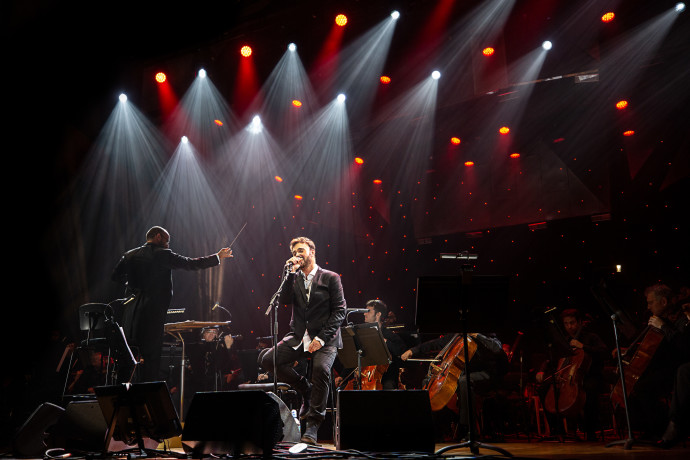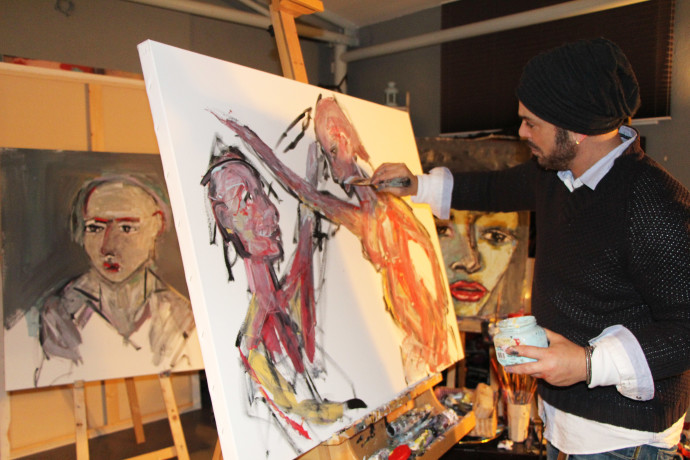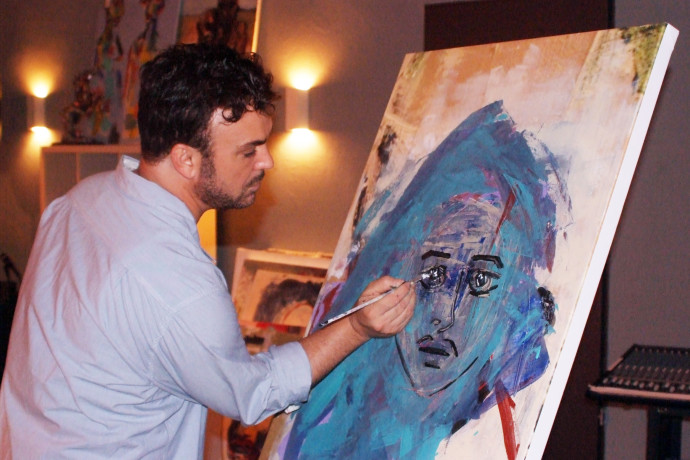“Music is a way to touch others,” says singer, composer, and songwriter David D’Or, “and it is a language that transcends logic. It creates a frequency of emotion, with which one can connect much more deeply.” Sitting in his Tel Aviv studio together with his wife Pazit, D’Or explains how he has become a musical ambassador for Israel, bringing his message and music to audiences around the world over the past 35 years. D’Or has intense, intelligent eyes, a quick smile, and a melodious speaking voice that offers a hint of his prodigious vocal skills.
The mid-afternoon light seeps into the studio on Rehov HaNagarim, where D’Or retreats occasionally to paint, sing, and reflect, depending upon how the mood strikes him. “This was my late father’s carpentry shop,” D’Or explains. Though he never formally studied art, D’Or quickly took to painting, and the studio walls are filled with examples of his work. “Art is similar to music,” he says. “Music is experienced through one’s ears, and art is experienced via the eyes, but everything joins together in the heart.” In addition to paintbrushes and art supplies, the studio is equipped with a piano and a guitar for sessions of musical creativity.
‘I’m always looking for places that speak to my soul’
D’Or began his musical career in 1991 and quickly became known for his remarkable countertenor voice, with a vocal range of more than four octaves. His first performance outside of Israel was arranged by Nurit Tinari, who was then Israel’s cultural attaché in Rome, and who is today head of the Cultural Relations Division at the Foreign Ministry. After hearing him sing, Tinari asked him to perform at the Vatican for an assembly of cardinals.

Since then, D’Or, who has won Israel’s “Singer of the Year” award three times, has performed for audiences in North America, South America, Asia, Europe, Australia, and North Africa. “My heart is in different places,” he says. “I’m always looking for places that speak to my soul.”
Most of D’Or’s performances outside of Israel have been for general audiences rather than for the Jewish community. Nevertheless, he explains that as an Israeli performer, he is representing Israel and is treated as such by his audiences.” Like it or not, you become an ambassador for this country. I never studied diplomacy, and I come from the world of music, but I have received many questions about Israel in the course of my performances in the Diaspora. We are a small country that the world finds intriguing, and people are interested in everything that is happening here.” Queries can range from general inquiries about life in Israel to “fake news” items such as a comment D’Or received from a Swedish audience member, who wanted to know why Israel is “withholding water from the Palestinians.”

D’Or acknowledges that he cannot answer every question or criticism of Israel. “I don’t always know what to answer, and I am not a diplomat,” he says. Nevertheless, he adds, “after my performances, I receive comments and positive reactions from people who are not among our greatest admirers, but something changed because of the concert, and they began to think about things differently.”
D’Or recalls several performances where pro-Palestinian demonstrations were held outside the hall beforehand, and the audience inside was in an uproar. “After ten or fifteen minutes, everything changed, because we can tell a story through music. I try to tell our story through the experiences of people. We are all human beings, and we can all identify with that story. The feelings of a mother who lost her child in a war are the same, regardless of the war or the circumstances in which it occurred. When I sing “Tishmor Al Ha-Olam Yeled,” (D’Or’s 1993 hit song entreating children to watch over the world), I talk about its meaning, and when I sing songs that express what’s happening in Israeli society, the frequency changes. And then we realize that we are all people, with the same feelings. Then, the journey begins.”
As a performer, D’Or is representing Israel and is treated as such by his audiences
D’Or always devotes a segment of his concerts to singing a medley of classic Hebrew songs, including Hava Nagila, which audiences worldwide are familiar with – “everyone in China knows it,” he quips. He makes a point of singing songs in Hebrew whose roots are from Jewish sources, as well as selections in the language of the country where he is performing.
While D’Or enjoys performing around the world, he has a unique affinity with audiences in Italy. “I have a special connection with them,” he says. He says that Italian audiences seem to have a special appreciation for his music. “I recall singing a piece from “Phantom of the Opera,” and I came to a very high note in the song. When I sang that note, they stood and applauded.”
Another country on D’Or’s list of favorites is Taiwan. Paradoxically, he notes, the people of Taiwan, whose culture is so foreign to Israeli culture, have warm feelings for Jews and the State of Israel. “They are not affected by the Israeli-Palestinian struggle,” he says. “For them, when they think of the Jews, they think of Albert Einstein and other Jews who have given to the world. They are not as judgmental. They are Buddhist and very tolerant, and they ask, ‘Why do people hate the Jews?’ Two of D’Or’s albums recorded in Taiwan became gold albums. The Taiwanese recognize our songs, or they recognize Israel through my voice, which is their first experience with Israel,” says D’Or. “They are very kindhearted.”
D’Or originally trained as a classical tenor and has mastered and performed songs in a wide variety of musical styles, including soul, rock and roll, classical, rhythm and blues, as well as traditional Jewish prayers. After the passing of his father some fifteen years ago, he returned to the synagogue and was captivated by the tunes of the Selihot, the penitential prayers recited during the High Holidays. D’Or approached recording companies, but none of them were interested in issuing a recording of those tunes. Despite their opposition, he persisted, and his recordings of traditional Jewish songs helped popularize traditional Jewish music in Israel. D’Or conducted four Selihot performances this past year at the Sultan’s Pool in Jerusalem and says these concerts attracted Israelis of all kinds. “You saw Haredim standing next to people wearing knitted kipot, standing next to secular Jews, with gay couples dancing on the side, and it was all with love and inclusion and the strength that music can make. Music is a language that has the power to connect.”
During his varied career, D’Or has performed for world leaders, including the last three Popes – John Paul II, Benedict XVI, and Francis – and made certain that a Hebrew song was among the selections he performed for them. When President Barack Obama visited Israel in 2013, D’Or sang “Amazing Grace” in his honor at the official presidential residence of then-President Shimon Peres in Jerusalem. D’Or sang the song in a high vocal register and recalls, smiling, “President Obama has a very low voice, and he said that he enjoyed it. He told me that if I would come to the White House, he would sing the bass parts, and I would sing the higher sections.” In the course of one of his Vatican performances, D’Or recalls thinking to himself, ‘Here I am, a Jew born in Bat Yam, singing for these cardinals!’ He also relates that Shimon Peres had specified in his will that D’Or chant the Avinu Malkeinu prayer at his funeral. D’Or was moved by the request and sang the prayer at the funeral.

Before the onset of the pandemic, says D’Or, he would spend several months a year on the road, performing outside Israel. “Corona changed everything,” he says, “and the situation still has not returned to normal.” Many countries have not begun to bring artists from the outside to perform, particularly countries in the Far East.
Despite his aforementioned affinity for performing before world audiences, D’Or’s first loyalty is to his homeland. He will be performing in Israel with the Israeli Philharmonic on February 2 at the Heichal HaTarbut in Tel Aviv. Since the beginning of his career, he says, he has turned down offers to relocate to countries outside Israel that might have furthered his musical career. “I decided that I would never establish my career outside Israel.” D’Or’s family has deep roots in Israel, and he says, “One could speak about anything with my grandmother, but she could not tolerate if someone said something bad about the land of Israel.”
D’Or attributes his cultural and musical versatility to his childhood in Bat Yam. “We lived in a housing development with all of the new immigrants,” he says. “A Polish family lived next door, and an Iraqi family lived upstairs. One floor below was a Moroccan family, and a Persian family lived nearby. We heard all of the musical styles growing up, and as a result, their music is not foreign to us. Israel is a center that can fuse all musical styles from around the world.”
David D’Or says that music is underutilized today in its ability to foster communication and understanding between people. “Shimon Peres told me that he could speak for a long time, and some might agree with what he says, while others would disagree. I can sing for three minutes, and everyone will understand my message and will be moved by it.”
This article was written in cooperation with the Foreign Affairs Ministry.
